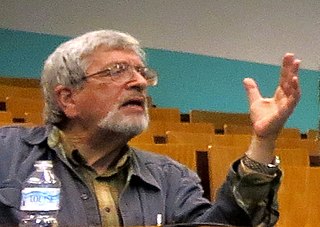Musicology is the scholarly study of music. Musicology research combines and intersects with many fields, including psychology, sociology, acoustics, neurology, natural sciences, formal sciences and computer science.

Christoph Wolff is a German musicologist. He is best known for his works on the music, life, and period of Johann Sebastian Bach. Christoph Wolff is an emeritus professor of Harvard University, and was part of the faculty since 1976, and former director of the Bach Archive in Leipzig from 2001 to 2014.
Gustave Reese was an American musicologist and teacher. Reese is known mainly for his work on medieval and Renaissance music, particularly with his two publications Music in the Middle Ages (1940) and Music in the Renaissance (1954); these two books remain the standard reference works for these two eras, with complete and precise bibliographical material, allowing for almost every piece of music mentioned to be traced back to a primary source.

Richard Filler Taruskin was an American musicologist and music critic who was among the leading and most prominent music historians of his generation. The breadth of his scrutiny into source material as well as musical analysis that combines sociological, cultural, and political perspectives has incited much discussion, debate and controversy. He regularly wrote music criticism for newspapers including The New York Times. He researched a wide variety of areas, but a central topic was Russian music from the 18th century to the present day. Other subjects he engaged with include the theory of performance, 15th-century music, 20th-century classical music, nationalism in music, the theory of modernism, and analysis. He is best known for his monumental survey of Western classical music, the six-volume Oxford History of Western Music. His awards include the first Noah Greenberg Award from the American Musicological Society in 1978 and the Kyoto Prize in Arts and Philosophy in 2017.
Joseph Wilfred Kerman was an American musicologist and music critic. Among the leading musicologists of his generation, his 1985 book Contemplating Music: Challenges to Musicology was described by Philip Brett in The Grove Dictionary of Music and Musicians as "a defining moment in the field". He was Professor Emeritus of Musicology at the University of California, Berkeley.
William Oliver Strunk was an American musicologist. Charles Rosen called him one of the most influential American musicologists of the 1930s to the 1960s. He was known for his anthology Source Readings in Music History (1950) and his work on Byzantine music. He was the son of Elements of Style coauthor William Strunk, Jr. (1869–1946)
Leo Treitler is an American musicologist born in Dortmund, Germany. He is distinguished professor at the Graduate Center of the City University of New York.
Harold Stone Powers was an American musicologist, ethnomusicologist, and music theorist.
Howard Mayer Brown was an American musicologist.

Otto Kinkeldey was an American music librarian and musicologist. He was the first president of the American Musicological Society and held the first chair in musicology at any American university.
Gary Alfred Tomlinson is an American musicologist and Sterling Professor of Music and Humanities at Yale University. He was formerly the Annenberg Professor in the Humanities at the University of Pennsylvania. He graduated from the University of California, Berkeley, with a Ph.D., in 1979 with thesis titled Rinuccini, Peri, Monteverdi, and the humanist heritage of opera.
Lewis H. Lockwood is an American musicologist whose main fields are the music of the Italian Renaissance and the life and work of Ludwig van Beethoven. Joseph Kerman described him as "a leading musical scholar of the postwar generation, and the leading American authority on Beethoven".
Karol Berger is a Polish-American musicologist.
Rose Rosengard Subotnik is a leading American musicologist, generally credited with introducing the writing of Theodor Adorno to English-speaking musicologists in the late 1970s.
James Haar was an American musicologist and W.R. Kenan Jr. Professor Emeritus of Music at the University of North Carolina at Chapel Hill. A specialist in Renaissance music, he was the Editor-in-chief of the Journal of the American Musicological Society from 1966 to 1969 and served as the president of American Musicological Society from 1976 to 1978. He was elected a member of the American Academy of Arts and Sciences in 1987.
J. Peter Burkholder is an American musicologist and author. He is Distinguished Professor Emeritus of Musicology at the Indiana University Jacobs School of Music. He has written numerous monographs, essays, and journal articles on twentieth-century music, Charles Ives, musical borrowing, American music, musical meaning, analysis, and music history pedagogy. He is the principal author of A History of Western Music, 10th Edition, published by W. W. Norton & Company.
Nicholas Mark Temperley was an American musicologist of English background. He is known for his pioneering work in British music studies.

Albertus Antonius Smijers, was a Dutch musicologist who served as Professor of Musicology at the University of Utrecht. As one of the first Dutch musicologists to receive a doctorate, he chaired several organisations such as the International Musicological Society. Smijers was also a noted authority on Josquin des Pres; he published 44 volumes of Werken van Josquin des Prez from 1941 until his death, while another 11 volumes were published posthumously by his students.

Jeremy Noble was an English musicologist and music critic who specialized in classical music. His career comprised two fields, musicological scholarship and music criticism. In the former, he focused on early English music, Venetian music and particularly the life and work of Renaissance composer Josquin des Prez. His colleague Stanley Sadie noted that "Although only a fraction of his research has been published, the breadth and depth of his knowledge and his generosity towards fellow scholars have made him an important participant in late 20th-century musicology."





